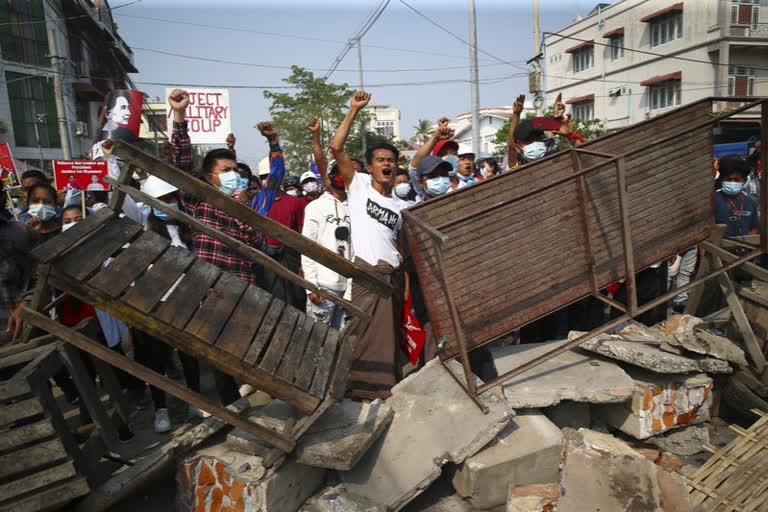Yangon (Myanmar): The U.N. Human Rights Office says it has received “credible information” that a crackdown Sunday on anti-coup protesters in Myanmar has left at least 18 people dead and over 30 wounded.
“Deaths reportedly occurred as a result of live ammunition fired into crowds in Yangon, Dawei, Mandalay, Myeik, Bago and Pokokku,” it said in a statement, referring to several cities in Myanmar. “Tear gas was also reportedly used in various locations as well as flash-bang and stun grenades.”
“We strongly condemn the escalating violence against protests in Myanmar and call on the military to immediately halt the use of force against peaceful protesters,” its spokesperson Ravina Shamdasani was quoted saying.
It would be the highest single-day death toll among protesters who are demanding that the elected government of Aung San Suu Kyi be restored to power after being ousted by a Feb. 1 coup.
Security forces in Myanmar made mass arrests and used lethal force on Sunday as they intensified their efforts to break up protests a month after the military staged a coup. At least four people were reportedly killed.
READ: HRW condemns use of lethal force by Myanmar forces
There were reports of gunfire as police in Yangon, the country’s biggest city, fired tear gas and water cannons while trying to clear the streets of demonstrators demanding that the elected government of Aung San Suu Kyi be restored to power. Photos of shell casings from live ammunition used in assault rifles were posted on social media.
Reports on social media identified by name one young man believed to have been killed in Yangon. His body was shown in photos and videos lying on a sidewalk until other protesters were able to carry him away.
A violent crackdown also occurred in Dawei, a much smaller city in southeastern Myanmar, where local media reported that at least three people were killed during a protest march. The fatalities could not immediately be independently confirmed, though photos posted on social media showed a wounded man in the care of medical personnel, and later laid out in a bed under a blanket with flowers placed on top.
Confirming reports of protesters’ deaths has been difficult amid the chaos and general lack of news from official sources.
Prior to Sunday, there had been eight confirmed reports of killings linked to the army’s takeover, according to the independent Assistance Association of Political Prisoners.
The Feb. 1 coup reversed years of slow progress toward democracy after five decades of military rule. Suu Kyi’s National League for Democracy party would have been installed for a second five-year term in office, but the army blocked Parliament from convening and detained her and President Win Myint, as well as other top members of Suu Kyi’s government.
Sunday’s violence erupted in the early morning when medical students were marching in Yangon’s streets near the Hledan Center intersection, which has become the gathering point for protesters who then fan out to other parts of the city.
